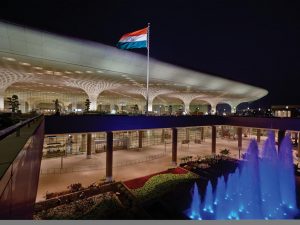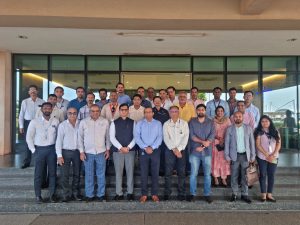Keku Bomi Gazder, MD and CEO, Aviapro Logistic Services said, “The rapid growth of e-commerce and demand for high-value, time-sensitive goods will further propel air cargo volumes, enhancing India’s role in global trade. According to industry projections, India’s air cargo volume is expected to grow by 8-10% annually, driven by the rise in e-commerce and demand for high-value goods. India’s aviation and logistics sector is poised to significantly boost exports, driven by the expansion of air cargo services, aircraft manufacturing, and MRO (Maintenance, Repair, and Overhaul) capabilities. As India strengthens its position as a global hub for aircraft production and assembly, the export of aviation components and technologies will increase.”
Read More »CSMIA International Cargo Grows 17% Over CY2023
Chhatrapati Shivaji Maharaj International Airport (CSMIA) capped off 2024 on a high note, solidifying its role as a cornerstone of India’s air freight network by achieving significant milestones in cargo operations. International cargo volumes rose by an impressive 17 percent. Demonstrating continued efficiency, the airport’s cargo operations achieved the highest-ever daily tonnage of 204 MT, marking another milestone in the airport’s commitment to enabling seamless global trade. CSMIA’s Cargo Terminal achieved remarkable growth across both international and domestic cargo categories. In March 2024, the cargo operations set a new milestone by handling a record-breaking 60,659 metric tonnes (MT) of international cargo, underscoring its strategic significance and operational excellence. Throughout the year, CSMIA significantly enhanced global connectivity, now serving 687 international destinations. This expansion included new destinations such as Tripoli, Khabarovsk, Kaliningrad, Zhukovsky, Tyumen, Damascus, Honinabi, and Chisinau. Domestically, the airport reinforced its position as a vital logistics hub, prioritising pharmaceuticals, automobile goods, and dangerous goods (DG), thereby strengthening its role in a comprehensive air cargo ecosystem. Notably, international cargo volumes at CSMIA were split between 55 percent of exports and 45percent of imports, with London, Frankfurt, Chicago, Dubai, and Amsterdam emerging as the top global destinations. On the international front, pharmaceuticals, agro products, and automobile goods emerged as key drivers, recording year-on-year increases of 24 percent, 22 percent, and 20 percent, respectively. On the domestic front, automobile goods led the surge with a remarkable 31 percent growth, followed by engineering goods at 22 percent and post office mail at 15percent. The festive season further amplified the e-commerce boom, with international shipments witnessing a 53 percent year-on-year growth and domestic e-commerce goods achieving an 11 percent increase. Agricultural exports also reached …
Read More »India’s port capacity to expand 10,000 MT per annum by 2047
India is expanding its port capacity more than sixfold to reach 10,000 million tonnes per annum by 2047, marking the country’s largest-ever maritime infrastructure drive as it positions itself as a global shipping hub. Speaking at the FICCI Maritime Conference and Expo 2025, Union Minister for Ports, Shipping and Waterways, Sarbananda Sonowal revealed that major ports are already handling 820 MMT of cargo annually, representing a 47 per cent increase since 2014, while overall port capacity has doubled to 1,630 MMT during the same period. “India’s maritime sector has become a cornerstone of the country’s economic resurgence,” he said. The expansion programme includes the development of two strategic mega-ports: the Vadhavan Port in Maharashtra, set to become India’s largest container facility, and the International Container Transshipment Port at Galathea Bay in Great Nicobar, aimed at capturing transhipment trade along key global routes. “These achievements epitomise our vision of Ports for Prosperity, where infrastructure serves as a springboard for economic growth and job creation,” said the Minister. The maritime modernisation drive has already yielded significant efficiency gains. Container dwell time has been reduced to three days, while vessel turnaround time has improved to 0.9 days, surpassing several advanced economies. Nine Indian ports now feature in the World Bank’s Container Port Performance Index 2023, with Visakhapatnam ranking among the top 20 globally.”
Read More »‘Investments in infra can encourage MSMEs to scale-up’
Gregory Goba Ble, Head of UPS India and Director of MOVIN Express said, “Investments in the logistics sector can support India’s trade goals, enhance economic efficiency and encourage MSMEs to scale-up. To further strengthen India’s position in global markets, achieve the objective of National Logistics policy, and reach the export target of US$2 trillion by 2030, the thrust should be to simplify export compliance procedures and reduce regulatory cost for logistics players. We hope to see measures to expedite e-commerce clearances and simplify cross-border online transactions. There needs to be increased budget allocation for the healthcare sector, which relies heavily on a robust and integrated logistics network. This will ensure efficient delivery of medical supplies and increase the sector’s overall effectiveness to cater to pharmaceutical and patient requirements. In the earlier budgets, the Government has announced programs and initiatives to support MSMEs and we expect that to continue. We hope MSMEs, especially in the tier 2-3 cities, are further empowered with capital and technology adoption for them to compete in global markets.”
Read More »‘Belly & freighter capacity impacted, delays in cargo movement’
Currently, due to the unpredictable weather conditions in Europe and U.S., both belly and freighter capacity is getting impacted, it is also causing massive flight cancellations and delays in cargo movement,” said Satish Lakkaraju, CEO, NexGen Logistics, Garudavega. He added, “Recent fires at the U.S. (Los Angeles) have also created apprehensions in the minds of the Indian exporters and importers. Dollar rates rising to 86 is a good sign for Indian exporters but a cause of concern for importers. In the coming years, the U.S. dollar to Indian rupee exchange will continue to be volatile given the fact that India continues to import crude oil and that is another important aspect from a cargo standpoint. Fuel surcharge is one of the important aspects for arriving at the freight rates. In the express industry, the freight rates change on a weekly to a monthly basis. But, in the cargo industry, the freight rates from the airlines change on monthly basis. So that’s one volatile factor that also determines the prices for the air freight when you may have a base rate on it. 18 per cent GST on air freight is another concern for industry, impacting businesses. The ongoing Russia-Ukraine war is still impacting the global supply chains. To avoid the war zones, the traders are taking longer routes which basically means longer transit times both the air and ocean.”
Read More »ST Logistics Lenovo unite to improve technology in warehouses
Singapore logistics firm ST Logistics has teamed up with Lenovo to automate key processes within its facilities through a new warehouse execution system and AI-powered algorithms, says release. The warehouse execution system is designed to optimise the movement of goods within the warehouse, automatically charting the quickest and safest routes for transporting items to speed up order fulfilment. In addition, Lenovo’s computing systems, including its ThinkSystem Servers will power AI algorithms designed to optimise goods storage, prioritising items ready for immediate shipping for easier accessibility. “Through meetings and onsite visits, Lenovo gained a clear understanding of our goals and delivered more than just hardware and software,” said Lance Ong, deputy general manager for homeland security operations at ST Logistics. “Their support and ecosystem drove tangible outcomes, and we know we can always count on them. This strong foundation underpins our successful partnership.”
Read More »ACFI’s meet focused on boosting air cargo ops in Goa
The Air Cargo Forum India (ACFI) Goa Chapter recently held stakeholders meeting at Manohar International Airport (MOPA) emphasising air cargo’s critical role during the pandemic and its evolution. The forum covered relevant points like air cargo industry and ACFI’s vision for growth, the importance of air cargo in bridging supply chains for various sectors, the role of ACFI in policy advocacy and process simplification for the air cargo industry. ACFI also engaged with the Ministry of Civil Aviation to address the single window system and ensure all necessary agencies are involved. ACFI training committee will soon develop and implement training programs for skill development in the air cargo industry. Focus was on how can local chapters like the Goa chapter contribute to the overall growth of the air cargo sector, how can ACFI improve the efficiency of customs operations, especially for transshipment cargo. The meeting was attended by airlines, MOPA and Dabolim Airport representatives, forwarders, CHAs among others.
Read More »‘Govt must introduce robust capex in developing both physical & digital infra’
Sharing his pre-budget expectations, Ravi Jakhar, Chief Strategy Officer, Allcargo Group said, “The logistics industry is poised to play an enabling role in driving economic growth on the back of policy support, technology integration and continued infrastructure development. Hence, in the Union Budget 2025-26, we expect the government to propose robust capex in developing both physical and digital infrastructures to build the pathway for India to become a $5 trillion economy by FY27-28. For the logistics industry, the continued push by the government for infrastructure development through initiatives like National Infrastructure Pipeline (NIP), PM GatiShakti National Master Plan, etc. will help the industry make significant progress in achieving efficiency. A robust road, rail, air and waterway networks, growing network of multi-modal logistics parks, developing renewable energy infrastructure and strong digital infrastructure will further expand economic activities geographically, drive sustainability and enhance the service delivery capacity and capabilities for the logistics industry. A sustained capex push will also attract private investment in infrastructure development. However, considering long gestation, government has to take lead in logistics infrastructure capex to boost efficiency in supply chains. In addition, earlier E-commerce and now quick commerce’s rapid growth has underscored the necessity for agile and accelerated distribution capabilities. Therefore, the budget should propose fiscal measures to facilitate adoption of new-age technologies such as AI, automation, IoT so that the logistics industry breaks new grounds in efficiency as well as capacity utilisation and deployment.”
Read More »‘Govt must strengthen PPPmodel to create more scalable & sustainable training solutions’
Amitava Bakshi, President, Association of Supply Chain Professionals (ASCP) says, “While the government as well as the private sectors have focused on setting up skill development centres, it is still not meeting the demand supply gap. The supply chain sector is poised to grow at 10.5 per cent CAGR and will need 22 million skilled professionals in 2025 to manage the function. The infrastructure to develop these capabilities still needs further enhancement. The Government needs to strengthen public-private partnerships to create more scalable and sustainable training solutions. Further, there is an imbalance in the availability of these centres between urban and semi-urban/rural locations. Government needs to focus on setting up more skill development centres in the semi-urban/rural areas in the country.”
Read More »‘Lack of efforts in the industry to institutionalise skill development initiatives’
Nilratan Shende, Head – CSR, Allcargo Group said, “Skill development in the logistics sector has yet to achieve the desired momentum as there is lack of efforts in the industry to institutionalise skill development initiatives. Given the growing demand of logistics and supply chain services, it’s extremely critical for the industry to develop an institutional framework to generate trained human capital. Allcargo multi-skill development centre launched by Allcargo Group aims to build trained human resource pool equipped with the required sector-specific skills so that the logistics industry can enhance its service delivery capabilities and elevate its growth trajectory. Located at Bokadvira, Uran near JNPT, Navi Mumbai, the centre aims to plug the skill gaps in the industry and strengthen the employability of the youth with industry-specific training. Trainers at the centre are Logistics Skill Council (LSC) TOT (Training of Trainers) certified. It operates under the Pradhan Mantri Kaushal Kendra (PMKK) model and Pradhan Mantri Kaushal Vikas Yojana (PMKVY) flagship scheme of the Union Government’s Ministry of Skill Development and Entrepreneurship (MSDE). The training goal is to help students gain employment as consignment booking assistant, consignment tracking executive, inventory clerk, documentation assistant and warehouse picker/packer, heavy vehicle drivers, etc. The programs aim to improve their skill proficiencies in functional areas like warehousing documentation, booking, loading, unloading, tracking, MIS, picking and packing processes. Under its CSR initiative, Allcargo Group has launched the NIPUN program with centres at Mangalore, Chennai and Dadri and Gautham Budha Nagar in Uttar Pradesh. Nipun is an initiative by Allcargo Logistics and Avashya Foundation aimed at skill development of youth from the drought-affected backward areas of Maharashtra.”
Read More » Cargo Breaking News
Cargo Breaking News









